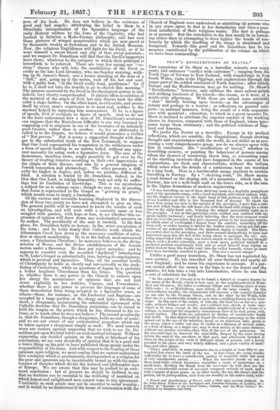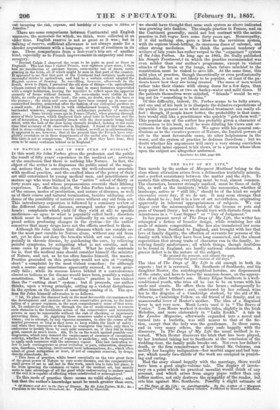SHAW'S RECOLLECTIONS OF TRAVEL. * LIE experience of Dr. Shaw as
a traveller extends over many years, and embraces "earth's wide extremes " ; ranging from thh North Cape of Norway to New Zealand, with wanderings in Nev South Wales, visits to the Diggings, and explorations through the larger part of the settled continent of North -America ; after which, Europe and the Mediterranean may go for nothing. Dr. Shaw's "Recollections," however, only embrace the more salient point, and striking incidents of his travels—the cream, as it were, of a world-wide pilgrimage. With these are mixed some scientific "chat" directly bearing upon travels—as the advantages of botany and geology to a tourist ; or reflections on general subjects—as national manners, being the result of a wide acquaintance with mankind ; education, to which in a great measure Dr, Shaw is inclined to attribute the superior comfort of the working classes in America, compared with those of England, whose ignorance keeps them stationary ; and the political relations of England and America.
We prefer the Doctor as a traveller. Except in his medical reflections, which are sensible, the disquisitions, though showing thought and acquaintance with the world, do not strike us as possessing a very comprehensive grasp, nor do we always agree with him in conclusion. His "recollections of travel," whether in describing scenery, or painting the behaviour of persons among whom the chances of wandering threw him, or recounting some of the startling incidents that have happened in the course of his explorations, are fresh and characteristic, without the tedium which arises when the details of a continuous tour axe recorded in a long book. Here is a hairbreadth escape incident to carriole travelling in Norway. By a "shelving road," Dr. Shaw means a road formed on the sloping side of a mountain ; which road, in Norway, has not a well-built wall on the lower side, as is the ease in the Alpine formations of modern engineering.
"I was travelling on one of these shelving roads in a fearfully precipitous part of the mountain-range, with a hard-mouthed, self-willed animal, without the slightest barrier to the right band of this perilous road, with a fall of one hundred and fifty to two thousand feet of descent. To check the beast from going too near to the margin of the precipice, I gave him a sudden jerk which broke the left-hand rein with the hand still acting for a short time on the right-hand rein, bringing the animal unavoidably right on to the precipice. I was at this particular crisis cribbed and confined with the apron tightly buttoned ; and firmly believing that the next moment would find me over the precipice, fear gave unusual power to the muscular system, in which state of excitement I leaped from the carriole, wrenching off the brass rail, or rather tearing to tatters the leather apron, and so got full possession of my pedestals without the slightest injury to myself. The horse proceeded close to the precipice' and there seemed instinctively to have had impressed upon him the fact of his being about to navigate the air; and, being unprovided with wings, was horror-struck at his folly having brought him to such a fearful extremity, gave a loud snort, gathered himself in a puckered position surprisingly well, and so saved himself from taking an atirial descent from this fearful road into the valley beneath, where he must have been inevitably smashed to pieces. This was a narrow escape."
Unlike a good many travellers, Dr. Shaw has not neglected his own country. He has travelled all over Scotland and nearly all over England ; and he turns his experience to account. If a person cannot afford the money or the time to see the desert and the prairies, let him take a run into Lincolnshire, where he can find a sort of substitute for both.
"In the county of Lincoln is to be found a district of country known by the name of the Marsh, which is best seen in the neighbourhood of Wain fleet and Skeg,ness' the latter scattered village and bathing-place of some
little note ; or atMablethorp, near Alford, in the same county. In this extraordinary locality, the excursionist will traverse a flat country bounded on one side by the German Ocean, and on the other by the Welds hills that rise to a considerable height so as to form a striking feature in the 'landscope. In this part of the county of Lincoln, the land lies as flat as a pan
cake, without hedges and woods; not a solitary tree, shrub, or bush, anywhere to be seen, except in the immediate neighbourhood of a house or a cottage, to interrupt the singularly monotonous view of its dark green, rich, grassy surface. The fields are separated by ditches of considerable depth and width. In this district will be found the richest pasturage in the world spread out to the eye of the beholder, broad as an American lake, green as the ocean, where a white cow may be visible at a distance of several miles, or a flock of sheep, or a single one, may be seen nearly at the same distance, without any greater elevation than that of the eye of the pedestrian. On the sea-coast may be observed the sand-hills, formed by the wind having driven the sand of the sea-shore to that part, and afterwards fastened it there by the action of the roots of different kinds of grasses, and a eeruby peculiar to the place and very widely diffused, and a great variety of tnaritime and other plants. "These sand-hills in some instances rise to a height of from fifty to one hundred feet above the level of the sea. At low-water, the ocean recedes sufficiently far to leave a considerable surface of beautiful white flat wind of very considerable extent When the traveller stands on one of these sand-hills—which formation resembles a range of mountains on a small scale, dividing the Marsh from the sea-coast—he will then see the ocean, a considerable extent of sea-coast composed entirely of sand, and a wide expanse of green grass; or in other words, the sea, the desert, and the prairie, all in juxtaposition, seen from one locality in his native land, with Trace! and Recollections of Trace!, with a Chat upon carious Subjects. By Dr. John Shaw Fellow of the Geological and Linmean Societies of London, So.; Author of " leambles in the United States, Canada, and the West Indies," Sic. Published by Saunders and Gag,.
out incurring the risk, expense, and hardship of a voyage to Africa or America."
There are some comparisons between Continental and English manners, the materials for which, we think, were collected at an older time. English reserve is not so great as it was but in talking of reserve sufficient allowance is not always made for a slender acquaintance with a language, or want of readiness in its use. These comparisons from a last-year's trip are of another kind, especially as to French improvements in carpentry and ironmongery. "Beyond Calais I observed the crops to be !pate as good as those in England. The last time I visited France, now eighteen years since, I then had no recollection of quickeet fences' corn-stacks out of doors, cattle grazing in the fields all of which might be seen in that part of the country. It appeared to me that that part of the Continent had certainly made BOUM successful strides in agriculture, and had to a certain extent adopted the
i
tag/h system of farming. In travelling, however, afterwards in. the South, down to Dijon, I perceived the old state of things—viz, agricultural villages instead of the farm-stead ; the land in many instances unprovided with a single habitation, leaving the traveller to reflect upon the apparent anomaly of farms without farmers. No corn-stacks were visible in the fields, no cattle grazing on the land ; the corn, no doubt, was in the barn or the granary ; the sheep and oxen mud have been cooped up in some circumscribed locality, somewhat after the fashion of our zoological gardens on a small scale. At Dijon I fell in with oldfashioned houses, with strongly barricaded windows, representing the architecture probably of reedimval times. . . . . Some twenty years ago in France [Paris], when passing through many of their houses, which displayed their usual taste in furniture and the art of decoration, I was invariably struck with the door-panels being badly fitted, with the lock of the door being clumsily finished, lacking at the some time that aceurary of fit observable in England. I found at that time also, that in stone-cutting they were very far behind, as well as in cabinetmaking. It appeared to me, however, that at the present time the French have completely overtaken us in these departments of the useful arts. In the country this taste is not so conspicuous. There in all that they have done, they seem to be many centuries behind us in England."



























 Previous page
Previous page